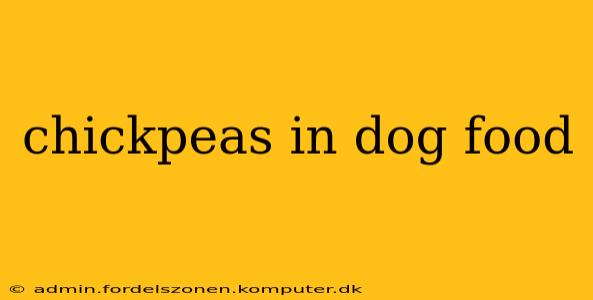Chickpeas, also known as garbanzo beans, are a nutritious legume enjoyed by humans worldwide. But are they safe for our canine companions? The short answer is: generally yes, but with some important caveats. This guide will explore the benefits, risks, and best practices for incorporating chickpeas into your dog's diet.
Are Chickpeas Good for Dogs?
Chickpeas offer several potential benefits for dogs when fed in moderation and appropriately prepared. They're a good source of:
- Fiber: Chickpeas are high in fiber, which aids in digestion and can help regulate bowel movements, preventing constipation and diarrhea. This is particularly beneficial for dogs with sensitive digestive systems.
- Protein: They provide a decent amount of plant-based protein, a valuable component of a balanced canine diet, especially for dogs who may benefit from alternative protein sources.
- Vitamins and Minerals: Chickpeas contain essential vitamins and minerals, including folate, iron, manganese, and phosphorus, all contributing to overall canine health.
How to Safely Feed Chickpeas to Your Dog
While chickpeas can be beneficial, it's crucial to feed them responsibly:
- Cooked, Not Raw: Raw chickpeas contain antinutrients that can interfere with nutrient absorption and may cause digestive upset. Always cook chickpeas thoroughly before feeding them to your dog.
- Moderation is Key: Chickpeas should be a supplementary treat, not a staple food. Too many chickpeas can lead to digestive issues like gas and bloating. Start with a small amount and monitor your dog's reaction.
- Proper Preparation: Avoid adding salt, seasonings, or other additives that can be harmful to dogs. Simply boiled or roasted chickpeas are the safest option. Ensure they are completely cooled before serving.
- Introduce Gradually: As with any new food, introduce chickpeas gradually to avoid digestive upset. Start with a tiny portion and increase the amount slowly over several days.
- Monitor for Allergic Reactions: Some dogs may have allergic reactions to chickpeas. Watch for signs such as itching, vomiting, diarrhea, or swelling. If you notice any adverse reactions, stop feeding chickpeas immediately and consult your veterinarian.
Can Dogs Eat Chickpea Flour?
Chickpea flour, also known as besan, is another product derived from chickpeas. Similar precautions apply; it should be cooked and used sparingly. You can incorporate small amounts of cooked chickpea flour into your dog's food, but always consult your vet first, especially if your dog has any dietary restrictions or health concerns.
Are There Any Risks Associated with Feeding Chickpeas to Dogs?
While generally safe, potential risks include:
- Digestive Upset: As mentioned, consuming too many chickpeas can lead to gas, bloating, and diarrhea.
- Allergies: Like any food, some dogs can be allergic to chickpeas.
- Choking Hazard: Whole chickpeas can pose a choking hazard, especially for smaller breeds. Make sure to mash or finely chop them before serving.
What are the Best Ways to Incorporate Chickpeas into My Dog's Diet?
- Mashed Chickpeas: Mash cooked chickpeas and mix them into your dog's regular food.
- Chickpea "Cookies": You can find recipes online for homemade dog treats incorporating chickpeas.
- Part of a Balanced Meal: Incorporate a small amount of cooked, mashed chickpeas as a supplement to a complete and balanced dog food.
My Dog Ate a Lot of Chickpeas – Should I Worry?
If your dog has consumed a large quantity of chickpeas, monitor them closely for signs of digestive upset, such as vomiting, diarrhea, or bloating. If you're concerned, contact your veterinarian immediately.
Can I Feed My Dog Chickpea Snacks from the Store?
Commercially produced chickpea snacks for dogs are available, but always check the ingredients carefully. Ensure they are made with simple ingredients and contain no added sugars, salts, or artificial flavors. Look for treats specifically designed for canine consumption.
By following these guidelines, you can safely and responsibly incorporate chickpeas into your dog's diet, adding a nutritious and delicious element to their meals. Remember, always consult your veterinarian before making any significant changes to your dog's diet, especially if they have pre-existing health conditions.
